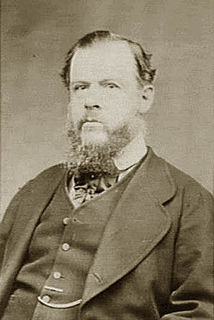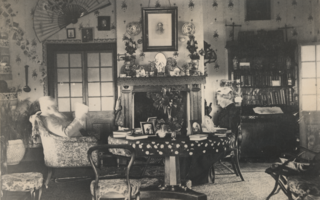
York is the oldest inland town in Western Australia, situated on the Avon River, 97 kilometres (60 mi) east of Perth in the Wheatbelt, on Ballardong Nyoongar land, and is the seat of the Shire of York.
Joseph Lucas Horrocks (1803–1865) was born in Anderton, Lancashire, near Bolton, on 18 November 1803, the first son of William Horrocks, a corn merchant, and Jane Smith. As a convict he was transported to Western Australia in 1851, becoming a prominent early pioneer of the town of Northampton.
James John Henry Hislop was a convict transported to Western Australia. After the expiry of his sentence, he became the first ex-convict in Western Australia to be appointed a teacher.
Thomas Berwick (1825–1891) was a convict transported to Western Australia. He was one of 280 such convicts from the 9721 convicts transported to the colony to overcome the social stigma of convictism to become schoolteachers.
James Henry Lloyd (1825–1898) was a convict transported to Western Australia, who later became one of the colony's ex-convict school teachers.
James Hasleby, was an English convict transported to Western Australia. He was one of only 37 convicts transported to the colony to overcome the social stigma of convictism to become school teachers, and one of only four convicts to be elected a member of a local Education Board. Notably, given his previous conviction at the Old Bailey, in 1893 he was appointed Clerk of the Local Court at Northampton.
John Vernon Warren (1826–1898) was a convict transported to Western Australia. He was one of only 39 such convicts from the 9721 convicts transported to the colony to overcome the social stigma of convictism to become schoolteachers.
Frederick Carter was a convict transported to Western Australia, later to become one of the colony's ex-convict school teachers.
Joseph Walton was a convict transported to Western Australia. The son of a watchmaker, Walton was born in Canada, but it was in England on 19 July 1851 that he was convicted of burglary and sentenced to ten years' penal servitude. Walton was transported to Western Australia on Dudbrook, arriving in February 1853. After obtaining his ticket of leave, he worked as a carpenter. He received his conditional pardon in July 1856, and the following month he married Fanny Kenney. Over the next few years he worked in the Avon and Greenough districts; his wife did not accompany him and the fact that he was married was not known. Walton took up land at Greenough, and built a hotel there. Later he won a number of contracts to build government buildings, including a one-room school, a police station and a courthouse.

John Henry Monger Jr was a Member of the Western Australian Legislative Council from 1870 to 1875, and again from 1890 to 1892.

James Elphinstone Roe was a convict transported to Western Australia. After serving his sentence he became one of the colony's ex-convict school teachers. Through his agitation for education reform, he played an important role in "shaping the education system and political policies in the colony". He later distinguished himself as a journalist.

Alfred Chopin was a convict transported to Western Australia. He became one of the colony's first portrait photographers.
William Chopin was a convict transported to Western Australia. After gaining his Ticket of leave he worked as a chemist and later as an illicit abortionist.

Patrick Stone was a Member of the Western Australian Legislative Assembly from 1901 to 1904, and from 1905 to 1908.

Samuel Pole Phillips was a prominent Australian pastoralist and politician.
William Mayhew was a medical practitioner in the Toodyay district of Western Australia. Mayhew was appointed medical officer for Toodyay in 1872 when the previous doctor, Arthur Edwardes Growse was transferred to Guildford. His original vocation was that of a teacher, and he and his wife Alicia had come to Western Australia to take up appointments in this profession. It is assumed that Mayhew had acquired his medical training in England before his arrival in Western Australia in 1867.
Owen Hackett (1809–1862) was one of a number of Enrolled Pensioner Guards (EPGs) that came to the Swan River Colony between 1850 and 1868. Their role was to guard and oversee the work of the prisoners transported to Western Australia.
John Acton Wroth (1830–1876) was a convict transportee to the Swan River Colony, and later a clerk and storekeeper in Toodyay, Western Australia. He kept a personal diary that recorded life on board the transport ship and his experiences at the country hiring depots of York and Toodyay. This diary is lodged in the archives of the State Library.
Charles George Ellery (1854–1937) was Toodyay's bootmaker and was assisted for a time by his brother James, and then his daughter Constance who continued the family business after his death in 1937. His name is associated with his home Shoemaker's House, and shop Ellery's Arcade. He was one of the Toodyay’s civic leaders sitting on a number of boards and committees.

The Queen's Head was a hotel in West Toodyay in Western Australia in the latter half of the 19th century.






